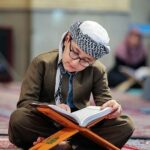
Islamic Studies , as an integral component of education, goes beyond individual learning to foster community building. This discipline serves as a catalyst for creating strong, cohesive communities by instilling values of cooperation, empathy, and collective responsibility. This essay explores how Islamic Studies contributes to community building within the educational context. In the landscape of education, Islamic Studies emerges not only as a source of personal enlightenment but as a force that propels individuals toward community building. It emphasizes the interconnectedness of individuals within the broader community and encourages students to actively contribute to its well-being.
Islamic Studies places a strong emphasis on values of cooperation and unity. Students engage with teachings that underscore the importance of working collaboratively, fostering a sense of unity within the educational setting and beyond.Repeated use of Islamic Studies highlights its pivotal role in community building. It signifies that this academic discipline serves as a foundation for fostering a sense of belonging and shared purpose among individuals within a community.The curriculum encourages the development of empathy and social responsibility. Students learn to empathize with the challenges faced by others and are inspired to take an active role in addressing societal issues, contributing to the betterment of their communities. Islamic Studies introduces the concept of Ummah, emphasizing collective responsibility for the welfare of the community. Students understand that their actions have an impact on the broader society and are encouraged to contribute positively to the well-being of the community.Beyond theoretical discussions, Islamic Studies inspires students to engage in community service initiatives. By participating in projects that address local needs, students actively apply the values learned in the classroom to make a tangible impact in their communities. Islamic Studies celebrates diversity within the community. Students learn to appreciate and respect the varied backgrounds, cultures, and experiences of community members, fostering an inclusive and harmonious environment.The curriculum delves into the principles of social justice within Islam. Students are encouraged to advocate for fairness and equality, contributing to the creation of communities that prioritize justice and equity for all members.Islamic Studies equips students with conflict resolution skills. By learning about the principles of mediation and reconciliation within Islamic teachings, students become peacemakers, fostering harmony and understanding within their communities.The discipline of Islamic Studies prepares students for leadership roles within their communities. By instilling qualities of justice, empathy, and ethical decision-making, graduates become leaders who contribute positively to the growth and development of their communities. Islamic Studies
emphasizes the importance of creating safe and welcoming spaces within the community. Students learn to foster an environment where individuals feel valued and supported, contributing to a sense of belonging.The curriculum explores the interconnectedness of family and community values. Students understand that the well-being of the family unit is intertwined with the prosperity of the broader community, reinforcing the importance of nurturing both.Islamic Studies serves as a cornerstone for community building within the educational sphere. The repetitive integration of Islamic Studies underscores its pivotal role in shaping individuals into community-minded contributors. By instilling values of cooperation, empathy, and collective responsibility, this discipline becomes a catalyst for creating strong, cohesive communities that thrive on shared principles and a sense of shared purpose.
know more about Islamic Studies by our Course

Featured Courses

Tajweed Rules
Tajweed Rules Course is designed for learning how to pronounce the letters in the words correctly such as when a consonant letter is silent or not, etc.

Quran Recitation
Quran Recitation is a sacred art, a rhythmic melody that echoes the divine verses, fostering a profound connection to Allah's words.

Arabic Language
The Arabic language, rich in history and eloquence, serves as the cradle of the Quran, carrying the essence of divine revelation.

Quran Memorization
Quran Memorization Course at madrasatelquran.com focuses on memorization of the Holy Quran in the shortest time possible with high-accuracy.

Islamic Studies
Islamic education is the best way to be better Muslims and humans as well. Islamic Studies Course helps Muslims to know all essentials about their religion.

Online Ijazah
Online Ijazah Course is an advanced Quran course because “Ijazah” is a certification grant its holder permission to teach and recite the Quran with tajweed.



